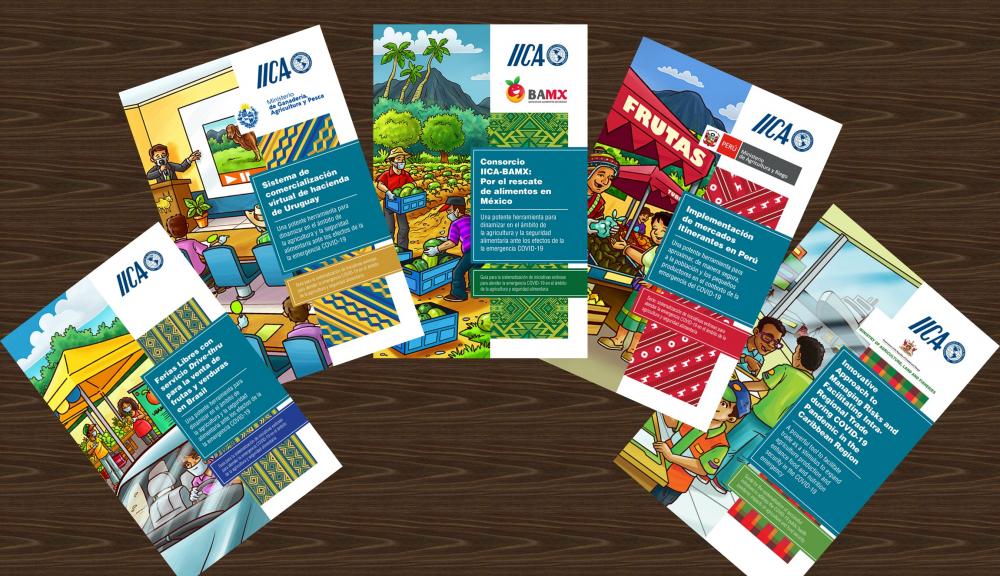IICA showcases the experiences of seven countries in the Americas that have strengthened their agrifood systems in the face of Covid-19

San Jose, 1 October 2020 (IICA). Short- and medium-term best practices in Latin America and the Caribbean, to support continued activity in agrifood systems and to guarantee food security during the pandemic, were documented and put online by the Inter-American Institute for Cooperation and Agriculture (IICA) to promote their adaptation and implementation in other countries in the hemisphere.
The experiences, outlining how ministers and secretaries of agriculture of Brazil, Grenada, Mexico, Peru, Uruguay, St. Vincent and the Grenadines and Trinidad and Tobago ensured the continued trade flow of agricultural products and safe food supplies were systematized as part of IICA’s efforts to promote horizontal cooperation among countries in the region.
“From the onset of the pandemic, the secretaries and ministers of agriculture of the Americas, with IICA’s support and coordination, have held several high-level regional and hemispheric meetings to drive national and regional strategies that will ensure the continued functioning of agricultural production, intra and interregional trade, and access to safe food, in a bid to safeguard the food security of people in this hemisphere from the effects of Covid-19 and its impact on the economy”, explained Manuel Otero, Director General of IICA.
The actions of the seven countries focused on maintaining the operations of agrifood systems and distribution channels; supporting family farmers to access markets safely; and on facilitating the supply and availability of food to consumers, in a safe way, following each country’s health measures and protocols in response to the pandemic.
Initiatives in practice
One of the experiences involved the creation of outdoor markets with a drive-thru service for the sale of fruits and vegetables in Brazil. This has been implemented in the Federal District and in the states of Goiás, Piauí, São Paulo, Roraima, Minas Gerais, Bahía and Paraná.
People can remain in their vehicles, while they buy products in these markets. The aim is to prevent groups of people from crowding around food, such as fruit, vegetables and legumes. Consumers may also order by phone and indicate a time when they will collect their goods, which minimizes contact with producers, farmers or merchants, thereby creating a safer environment than traditional open-air markets.
The initiative implemented in Uruguay is the virtual ranch marketing system, which facilitates the purchase and sale of livestock without the need to travel to the auction site. The system also enables a more transparent market in terms of price-setting; increased competition; more easily accessible information on the product, through catalogues and videos; and lower overall transaction costs for cattle and sheep, among other benefits.
Another notable example was the IICA-Food Bank Network of Mexico (BAMx) Consortium: stockpiling food in Mexico, which focuses on stockpiling surplus food and transporting it to vulnerable groups, thereby protecting the health of people and facilities in which food is collected and distributed.
The initiative was launched in May at the Cancún, Quintana Roo Food Bank, which is one of the 55 centers in the Network. Assistance was provided to purchase 11 tons of black beans and 13 tons of rice to benefit 11,000 marginalized people from rural and indigenous communities in this tourism region, which was severely affected by the closure of hotels, tourist centers and restaurants, as a result of the pandemic, leaving thousands of workers vulnerable to food insecurity.
The project also benefitted employees and volunteers of the Cancún Food Bank, who received training and medical safety gear to protect against possible Covid-19 outbreaks.
Another initiative involved the implementation of mobile markets in Peru, which sought to supply essential food items from production areas to the population, primarily vulnerable groups. The aim was to prevent price speculation, hoarding or unjustified price increases for agricultural and agroindustrial products, and thereby to regularize the product supplies, despite the emergency situation in the country.
This allowed rural producers the opportunity to sell their essential items directly to consumers, at a fair price, and the markets are set up in places that are accessible to vulnerable communities.
An innovative approach to managing risks and facilitating intraregional trade during the Covid-19 pandemic in the Caribbean region was another initiative documented by IICA. It has been implemented in Grenada, St. Vincent and the Grenadines and Trinidad and Tobago.
It is a digital system that enable rapid issuing of phytosanitary certificates to avoid delays and disruptions in the trade flow of fresh produce among the three countries. It is part of efforts to ensure the supply of food and to foster imports and exports, specifically plants and plant products, amidst the extreme measures imposed to mitigate the pandemic.
Manuel Otero, Director General of the Institute, explained that, “IICA, through its Delegations in member countries, will continue to compile information on innovative measures adopted in the agriculture and rural sectors of the hemisphere to tackle the pandemic. To date, it has recorded more than 500 concrete measures to manage, maintain and strengthen the agrifood system in the current context”.
The systematizations can be accessed at the following link: https://iica.int/en/iniciativas-sist-agroalimentarios.
More information:
Pedro Avendaño, Specialist in Family Farming and Territorial Development, IICA.
pedro.avendano@iica.int
Marco Zapata, Coordinator of the Andean Region, IICA.